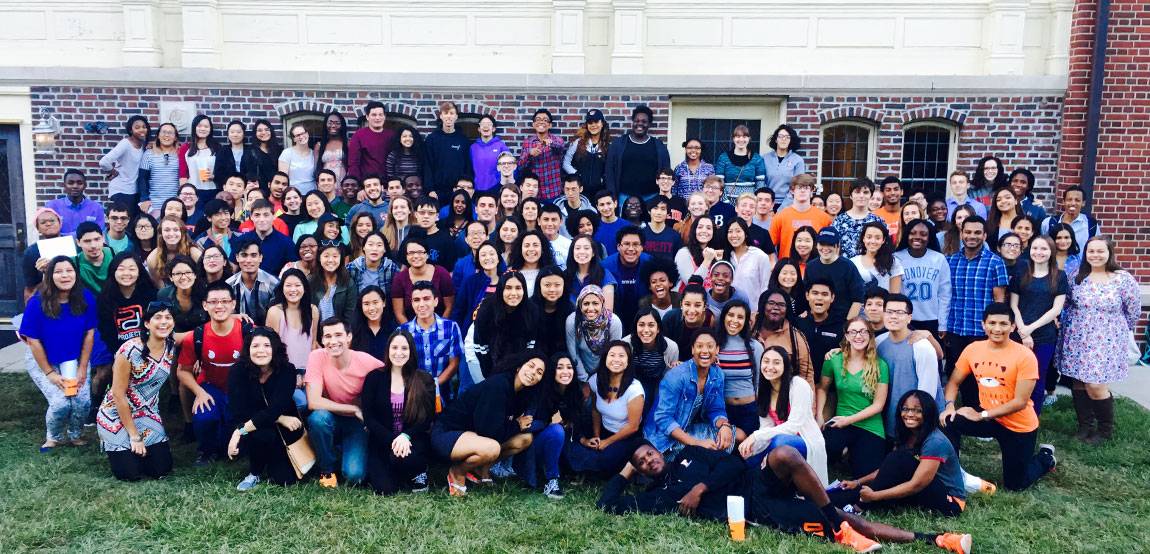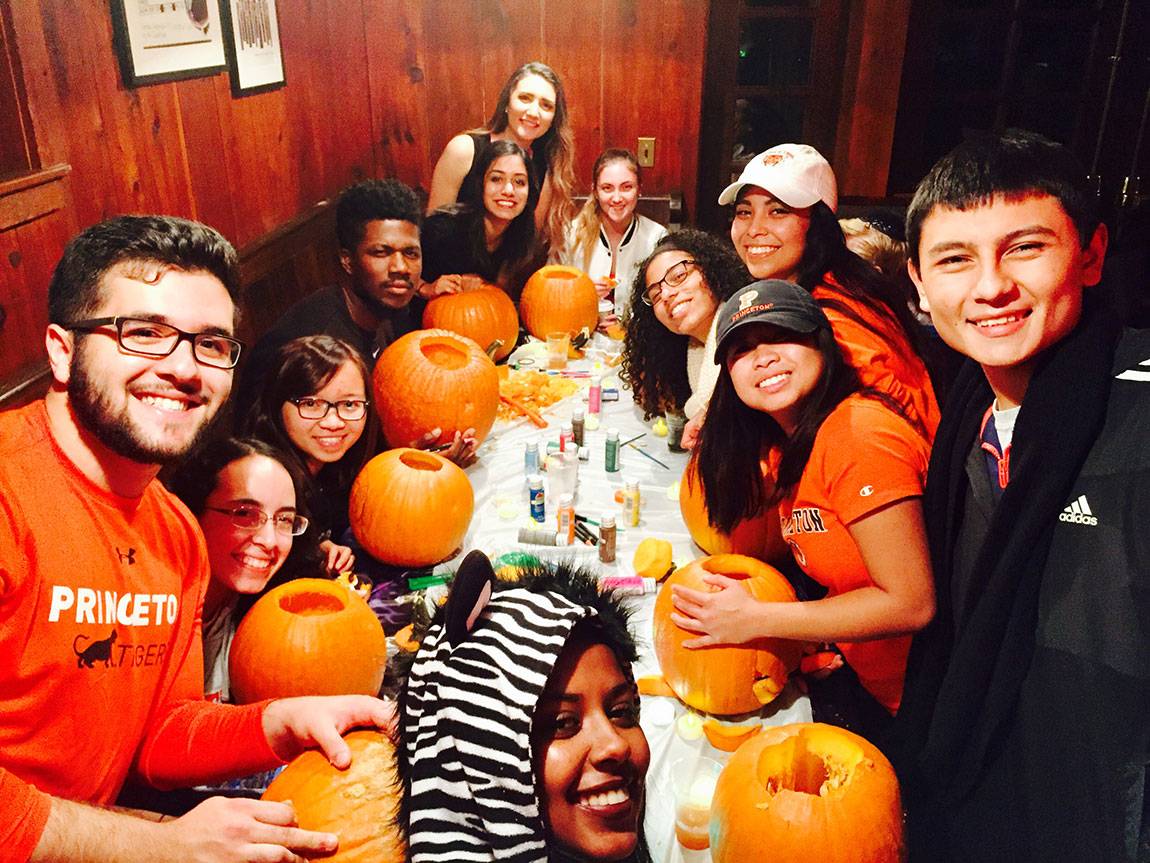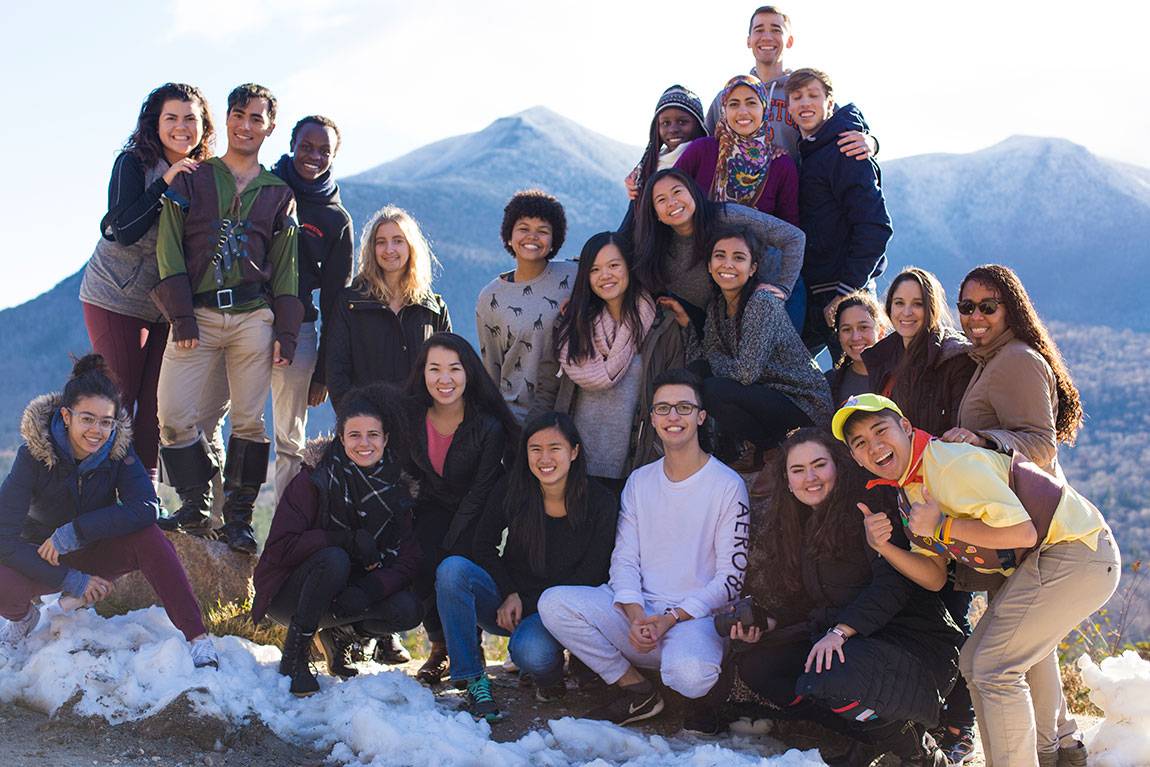Maricela Coronado, Class of 2018, says she got to Princeton "by accident."
One day in high school, a paper on the ground with the phrase "application fee waiver" caught her eye. So she picked it up and eventually applied to universities across the country through the nonprofit college match program QuestBridge. She later was accepted to Princeton, among other schools.
"I had no idea about the University. I didn't even know what the Ivy League was," said Coronado, a first-generation college student from the small city of Honey Grove, Texas. "Many students from my high school don't go on to college. The only reason I even applied here was because of the words 'fee waiver.'"
Coronado's experience coming to Princeton with limited knowledge of the University — and college life in general — is increasingly common as the number of first-generation and low-income undergraduates grows. Fifteen percent of Princeton freshmen are among the first in their families to attend college, and 21 percent are eligible for federal Pell grants for low-income students. Twelve years ago, 6 percent were first-gen and 7 percent were Pell-eligible.
This is where the Scholars Institute Fellows Program (SIFP) comes in. SIFP is among various University resources that empower undergraduates, particularly those from first-gen and low-income backgrounds, to thrive at Princeton. The program was launched by the Office of the Dean of the College (ODOC) in fall 2015 to provide mentorship opportunities, academic enrichment, and a support network of students, faculty and staff.
All students who identify as first-generation and/or low income are welcome to join, and other students may participate as allies. About 250 undergraduates are members of SIFP.

The number of first-generation and low-income undergraduates at Princeton continues to grow, and more programs have been developed to empower students from first-gen and low-income backgrounds to thrive at the University. The Scholars Institute Fellows Program (SIFP) was launched in fall 2015 by the Office of the Dean of the College to provide mentorship, academic enrichment, and a support network of faculty, staff and students. Here, some of SIFP's 250 undergraduate members gather for a reunion at the beginning of the academic year. (Photo courtesy of Ryan O'Mara for SIFP)
"With SIFP, we really are trying to create a community to give students the resources they need to achieve their academic and personal goals," said Associate Dean of the College Khristina Gonzalez. She leads the program with Nimisha Barton, associate director of programs for access and inclusion in ODOC.
Gonzalez and Barton also run the Freshman Scholars Institute (FSI), a longtime summer program that introduces select incoming students to Princeton through academic, co-curricular and extracurricular programs. SIFP builds on the goals of FSI — offering resources and community to more undergraduates during all four years here.
"FSI is a great foundation," Gonzalez said. "We wanted to expand it to create a network that students can rely on throughout their time at Princeton."
Dean of the College Jill Dolan said the University has worked in recent years to create more support structures and resources for students from all backgrounds. Student-organized groups, like the Princeton Hidden Minority Council, also play an important role.
"The Scholars Institute Fellows Program is an integral part of our efforts," Dolan said. "SIFP has pioneered a way to continue building community among our increasingly large cohort of low-income students."

Associate Dean of the College Khristina Gonzalez (second from left) talks with undergraduates at a dinner for first-generation college students at the Fields Center. Gonzalez leads SIFP as well as the Freshman Scholars Institute (FSI), a longtime summer program that introduces select incoming students to Princeton through academic and extracurricular activities. Gonzalez said SIFP expands on the goals of FSI, offering resources and community to more undergraduates during all four years on campus. (Photo by Denise Applewhite, Office of Communications)
Navigating college life
Dolan said SIFP's success lies in its comprehensive approach to helping students navigate their academic and social lives on campus.
"By focusing on peer and faculty mentoring, workshops about professional development and campus leadership, and discussions about how to best take advantage of the numerous support systems available to all Princeton students, SIFP helps integrate students who come to college without a deep knowledge of navigating an academic environment like Princeton," Dolan said.
SIFP faculty fellow Erin Vearncombe noted that first-gen and low-income students may not have had the same level of support in high school as other Princeton undergraduates. And some students, she said, may be uncomfortable with or unaccustomed to seeking help.
"Success at Princeton involves taking advantage of the many different kinds of resources available on campus, such as residential college advisers, Career Services, the Writing Center," said Vearncombe, a lecturer in the Princeton Writing Program. "SIFP teaches students about these resources and sends the message that they don't have to go through it alone."

Nimisha Barton (back row, far right) talks with students about how they can cultivate mentors on campus. Barton co-leads SIFP and is associate director of programs for access and inclusion in the Office of the Dean of the College. The workshop is one of many professional development, academic enrichment, peer mentorship and social events organized by SIFP to help first-generation and low-income students succeed at Princeton. (Photo by Denise Applewhite, Office of Communications)
Examples of SIFP activities and programs include:
Peer mentorship. In a cozy basement room of Campus Club, senior Monica Magalhaes gathers regularly with 10 freshmen and sophomores. They talk candidly about things like handling the stress of midterms, balancing academics and extracurricular activities, or the best paths for running on campus. Magalhaes moved from Portugal to Newark, New Jersey, when she was 10. And although Princeton is just an hour from home, it can feel a world away. "I wish SIFP had been around my first year. I really would have appreciated a mentor then," she said. "But I guess I don't think of myself as a mentor and my group as mentees. They are my friends. They help me as much as I help them."
Fellows program. Sandra Bermann, the Cotsen Professor in the Humanities and professor of comparative literature, is among the faculty, staff and graduate students who serve as SIFP fellows. She joins peer mentorship groups a few times each semester, and meets some students more often at meals or office hours. "It is so valuable for our students to get to know faculty and to become comfortable seeking us out. So I try to encourage this," Bermann said.
Academic enrichment. Students were not shy about asking questions in Nebil Ibrahim's fall semester precept for "General Chemistry." Almost all 20 freshmen attended FSI during the summer, are SIFP members or both. "Having a precept for FSI and SIFP students is a great way for them to stay connected with each other and make use of the scholarly community they started to build at FSI," Gonzalez said. Ibrahim said the freshmen also formed study groups for other classes. "Some people are really good at chemistry, while some are great at physics. It's really helpful to have friends who you feel comfortable with," he said.
Professional development. Gonzalez and Barton regularly host SIFP workshops on practical topics like how to write a cover letter or apply for a summer internship. One sunny morning this fall, Barton and four students gathered in the Fields Center strategizing how to cultivate mentors across campus. "We are situated in this wide web of support. It is not only your professor or your residential college dean, but a mentor could be someone from counseling services or your friend. All these people are here to help keep you afloat on a daily basis," Barton told the group. "It's really comforting — the resources never run out," freshman Alexa Adams said.
Social events and trips. A group of SIFP students toured New England during fall break and visited the Pocono Mountains during Intersession. The trips, organized by graduate student fellows Ryan and Sara O'Mara, are among many activities that SIFP sponsors on and off campus. "Some students cannot afford to travel home during breaks, so we become each other's families," Ryan O'Mara said. "For some, these trips may be their first visit to New York City, their first hike up a mountain or their first time seeing snow. Everything is new and exciting and I really enjoy being involved with SIFP to help shape this time in their life so it's a positive experience."

Students in a precept for "General Chemistry" last fall answer a question posed to the class. Almost all 20 freshmen in the precept attended FSI during the summer, are SIFP members or both. "Having a precept for FSI and SIFP students is a great way for them to stay connected with each other and make use of the scholarly community they started to build at FSI," Gonzalez said. (Photo by Nick Donnoli, Office of Communications)
Access, belonging, community
Ultimately, what SIFP has created is a new community. A community that for many feels like a second family. Vearncombe, SIFP's first faculty fellow, has been amazed to see the program's effect on campus in less than two years.
"SIFP is successful in cultivating a sense of belonging for students; letting them know they are part of the University for a reason and they have a community to support them," she said. "Princeton is one of the most distinguished institutions in the world and that aura of 'distinction' can be intimidating to anyone who studies or teaches here. I've heard accomplished professors express this feeling, so imagine how a first-generation or low-income freshman may feel?"
Sophomore Josh Faires said he felt overwhelmed before joining SIFP spring of his first year.
"I am a first-generation college student," Faires said. "It has been a challenging adaptation, considering I had no prior knowledge of college culture or strategies to survive classes. The combination of independent living with not understanding what was expected of me as a college student presented challenges in the classroom and my freshman year social life. I love SIFP because it helped me realize that these resources existed for me as a student and there was so much that Princeton could help me out with."

Undergraduates celebrate Halloween at a SIFP pumpkin carving on campus. First-generation and low-income students who are part of SIFP say the program has helped create a sense of belonging, support and community for them. (Photo courtesy of Ryan O'Mara for SIFP)
Senior Bri Christophers said SIFP helps students learn "how to make Princeton work for them."
"For first-generation/low-income students, Princeton can be overwhelming and confusing, and SIFP is there to fill in the gaps and offer guidance," said Christophers, a head student fellow. "I have learned about new campus resources and have connected to a new community; and I am forever grateful for Dean Gonzalez and Dr. Barton for being two of my biggest mentors this year."
Others echoed praise for Gonzalez and Barton's leadership. The administrators wear many hats, serving as organizers and mentors. At a cookies and crafts study break last semester, Gonzalez and Barton warmly greeted students around the room — hugging a junior they hadn't seen in a while, asking a sophomore if he needed someone to review his internship application and making sure a freshman was getting enough sleep.
"I thought the name 'Princeton' was intimidating before I got here, but Dean Gonzalez and Dr. Barton showed me that's not true," said Catherine Nguyen, Class of 2020. "They also inspire you to do more. They are always introducing you to new people and new opportunities on campus. They genuinely care about you."
Associate Dean of the Religious Life Matt Weiner, a staff fellow, said Gonzalez and Barton are really the heart of SIFP.
"I'm amazed by what they have created," he said. "They pay a lot of attention and detail to each student, really being personal and customizing the experience."
Weiner said he's observed a need for a group like SIFP in his role counseling students.
"As a chaplain, a lot of first-generation students come speak with me and it is clear they face a particular set of obstacles," he said. "SIFP provides students with the recognition that 'I'm not in this situation by myself.' I think the most important thing that we can do for students, SIFP students or otherwise, is help create communities for them."
As someone who was a first-generation student herself, faculty fellow Bermann empathizes with the experience of students in SIFP.
"As a faculty member and college head, I am eager to help all our students succeed," said Bermann, who also is head of Whitman College. "I also know that a place like Princeton can at times seem especially worrisome for low-income, first-generation students. I want these students to know they can and will succeed."
And she's found the students have as much influence on her as she tries to impart on them.
"What I enjoy most is simply getting to know the SIFP undergraduates and listening to their individual stories. I find that I learn so much from them — about their lives and about Princeton," Bermann said. "And it's a special pleasure to see how they bond with each other and with faculty and staff, and to watch them gather strength, confidence and broad communities of friends over their years here."

SIFP graduate student fellows Ryan and Sara O'Mara have taken undergraduates on SIFP-sponsored trips to New York City, New England, the Pocono Mountains and more. Last fall break, a group of SIFP students climbed Mt. Liberty in New Hampshire on the morning of Halloween. "Some students cannot afford to travel home during breaks, so we become each other's families," Ryan O'Mara said. (Photo courtesy of Ryan O'Mara for SIFP)






